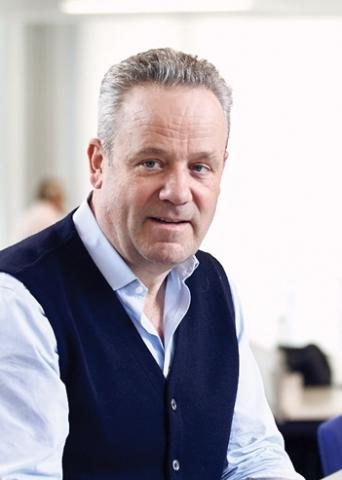
Go to the Glastonbury Festival, Formula One, the Rugby World Cup, a Red Bull air race, the Olympics or the Commonwealth Games, and you are not likely to give a second thought to who supplies the on-site power generators and coolers. Yet without them the events couldn’t happen.
That company is Aggreko, the world’s leading supplier of temporary energy. Its CEO is Chris Weston, the former boss of British Gas, who is believed to be the first OP to head a FTSE 250 company. It’s a job he loves, he said as we talked in Aggreko’s London office. The Glasgow-based company employs 7,300 people and operates in some 100 countries. It supplies multiples of one megawat generators to events, from weddings to sports and to whole countries, from Sub-Saharan Africa to Venzuela and Yemen.
Chris joined the college in 1977 and became Chief of the College for two terms in 1982, having served as Chief Cadet Captain of Hesperus Division. He admits he was not academic at Pangbourne. His greatest love was sports: captain of hockey; winning the 100 per cent [running] race; squash and swimming.
He went into industry by accident. Leaving Pangbourne he joined the Royal Artillery in the footsteps of his father, rising to the rank of Captain. But a serious knee injury led to his medical discharge in 1989. He studied at Imperial College, London, gaining his MBA and PhD, in an obscure branch of mathematics.
He had spells with the telecoms companies Cable & Wireless and the Australian-based Onetel, running its European arm where he saw its customers grow from 10,000 to over a million in two years. He sold its British arm to Centrica, the parent company of British Gas. This took him to Centrica in 2002. He rose through Centrica to lead its North American supply arm and became the boss of British Gas in 2013.
There were wildly innaccurate personal attacks on his pay scale at British Gas, including a front page article in the Daily Mirror. “I wish they were true,” he comments wryly. Public mistrust of the business world over pay ratios “is out of proportion and is blown up to some extent by the media,” he says.
His salary at Aggreko is nothing like the reported £5.5 million a year average for FTSE 100 board members. But it has enabled him to send his three daughters and a son to public schools (though not Pangbourne) from their home near Sevenoaks.
Was he disappointed he didn’t get the top job at Centrica? Chris deftly side-steps the question to say he was “extremely excited” to be head-hunted in 2014 to lead Aggreko. The markets may have been dubious of his new role, as an unknown face, and the company’s share price took a dip. But, despite a fluctuating share value, Aggreko is doing well with profits in 2015 of £270 million on revenues of £1.56 billion.
On the thorny issue of corporate governance, he asserts that “the governance of British companies is the best in the world.” Scandals such as the demise of BHS are the exception. Worker representatives on company boards, as Theresa May has proposed, may work in some circumstances but is of “questionable benefit” for Aggreko operating in 100 countries with only 700 employees in the UK. Brexit, he says, will hardly affect Aggreko, with 90 per cent of its business outside Europe.
So how does he see the “tone at the top”—his ethical leadership of the company? “It’s a fundamental issue,” he says. “We train our people in the problems about fraud and bribes.That is a message they have to hear from me.” Everyone in the company goes through ethics training every two years. No employee is sanctioned to give “facilitation payments”—bribes—to customs officers or to secure a contract. Not even £10, he says. “If you do it once, what happens next? In Aggreko we have a reputation for being unapproachable. How I behave, day to day, how I expect people to behave is fundamental for the company. Integrity in business is absolutely essential.”
He credits Pangbourne as encouraging him into leadership. “It did teach me about leadership, it did teach me to rely on myself and to be independent. The way it brings you up with integrity and decency and a sense of responsibility were things that Pangbourne helped to develop in me.”
He sees leadership as giving direction and creating teams that have the confidence to deliver. He quotes Lau Tzu: “As for the best leaders, the people barely notice their existence. When the best leaders’ work is done, the people say, ‘We did it ourselves’.”
Michael Smith is the author of ‘Leading with Integrity’, Routledge (2019).
First pubished in The Pangbournian, the annual magazine of the Old Pangbournian Society, 2017.
